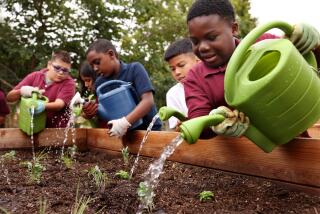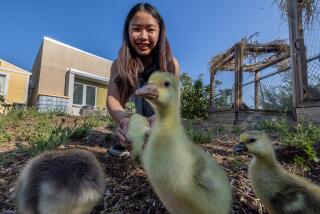Irvine Students Get a Taste of Where Food Comes From While Harvesting for Charity
- Share via
Some of the young workers knelt in the dirt, slicing off cabbages at the root, while others stood in line, passing the vegetables down the rows. Then, pausing to wipe sweat from their faces and brush dirt from their jeans, they lugged armfuls of cabbages to bins that were soon near overflowing.
Except for a few staff members and students with allergies, Lakeside Middle School in Irvine turned out Thursday morning to clear a field of crops left after the commercial harvest. In two hours, the group gathered about 20 tons of cabbage that will be donated to food banks as part of Orange County Harvest’s gleaning project.
The difficult work was an eye-opener for the seventh- and eighth-graders, who numbered more than 500.
“I’ve never done this before,” 13-year-old Megan Jimenez said. “It’s not easy. But it’s worth it because we’re helping people in need.”
Toiling under a hot morning sun was also a lesson about agriculture.
“Most of these students have never picked crops before,” Principal Bruce Baron said. “It just magically appears on the table. I want them to feel what it’s like to do this eight hours a day.”
Orange County Harvest began 12 years ago when some Irvine residents realized how much food was left to rot in the fields after farmers finished harvesting for market. The project now draws several hundred volunteers one Sunday each month, with each session typically filling two trucks sent by Second Harvest Food Bank in Santa Ana.
That makes it one of the largest volunteer efforts in the county, said A.G. Kawamura, the Irvine farmer who helped establish Orange County Harvest and who makes available many of the fields gleaned by the project.
Kawamura said the benefits are twofold: Food banks gain a steady supply of fresh fruits and vegetables, and volunteers learn about farming.
“We recognize the urban population has been so far removed from agriculture,” he said. “They’ve forgotten where the food comes from and how important agriculture is.”
The gleaners also get a taste of how labor-intensive farming is. After barely an hour at work Thursday, the Lakeside students were ready for a break. They sat on nearby railroad tracks, gulping water and spritzing one another.
“It’s hot, but we can deal with it,” said 12-year-old Maya Shany, dressed in overalls and her mother’s gardening gloves. Shany, who was born and grew up in Israel, said she had done similar volunteer work in her homeland.
A few students complained about heat, dust and odors. Some said they were fed up with cabbage and would never look at the vegetable again.
More to Read
Sign up for Essential California
The most important California stories and recommendations in your inbox every morning.
You may occasionally receive promotional content from the Los Angeles Times.













